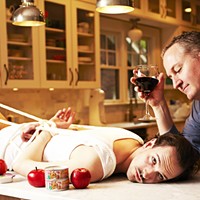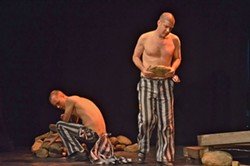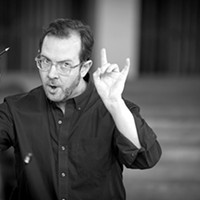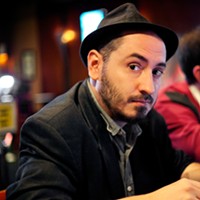It's not enough that we've had countless misquotes and alterations to philosopher George Santayana's famous quote, "Those who cannot remember the past are condemned to repeat it." Some, especially here in the South, missed the one-liner's point altogether. From immigration to constitutional amendments that ban gay marriage, bigotry looms on the forefront — preventing the still much-needed tolerance and human rights progress for society to function peacefully.
For example, have you heard that a neo-Nazi hate group plans to rally here in Charlotte on Nov. 10? This shockingly extremist behavior is sadly relevant to Martin Sherman's 1979 play, Bent, a story of two gay men who find love and heartache in a Nazi concentration camp. Queen City Theatre Company has revived the drama and is staging performances at Duke Energy Theater through Nov. 17.
But this isn't the first time our city has gotten a harrowing taste of the horrors of Nazi Germany. Back in 2002, Off-Tryon Theatre Company staged the Charlotte premiere of Bent. QCTC's artistic director Glenn T. Griffin then played the lead role of Max, currently undertaken by Kristian Wedolowski. Max is a hedonistic gay man who finds pleasure in one-night stands, alcohol and cocaine; despite his behavior, he's tolerated by his partner Rudy (James Glinski).
The play is set in 1934 Berlin; Paragraph 175, a law against homosexuality, was already in place, and Hitler and his willing executioners were enforcing their "cleanse" of Jews, homosexuals and others they deemed as inferiors.
Griffin was first inspired to reproduce the play after a visit to the Auschwitz concentration camp in Poland last year. This trip, coupled with hearing a homophobic sermon by N.C. pastor Charles L. Worley, led him to start working on Bent.
"So much has changed, but so much hasn't changed," says Griffin. "There is still this crazy hatred and fear for something people don't know about. And to hear a reverend at the pulpit behind his congregation say we should just put gays and lesbians behind electric fences ... that's really scary."
A small clip from Worley's anti-gay rant starts the show, setting an eerie momentum across a stage brimming with barbed wire fencing. Not long after, Third Reich brutalities begin, even against their own: The throat of an officer (Steven James) of the SA (Sturm Abteilung, aka stormtrooper) is slit after other Nazis learn he is homosexual. Max's closeted Uncle Freddie (Matthew Corbett) urges Max to leave for Amsterdam, but without passage for Rudy, Max refuses. Greta, a cross-dressing club owner (Charlton Alicea), provides the crowd with the show's lightest moment, a cabaret number about the splendor of life in Berlin before the Third Reich.
But shortly after this interlude, the setting of the Dachau concentration camp in Germany, where Max is sent after being captured, is bleak. Max denies being gay and wears a yellow badge for Jews as opposed to a pink triangle badge for homosexuals. In Dachau, he meets Horst (Scott A. Miller), a gay rights activist who proudly wears the symbol.
Actors who play characters in Max's life later take on the stark roles of Nazis. Griffin offers a creative shift to their appearances in that he doesn't change them at all — he only adds Nazi garb so that they loom like ghosts, a reflection of how Max is haunted by his past. To add to the oddities, the Nazis never speak. Instead, cold, metallic-like voice-overs echo commands to prisoners.
"I don't feel they could have been human," says Griffin. "I feel that their humanity was stripped aside when they did what they did."
Wedolowski, who plays Max, finds his role encouraging. In a place of death, the dynamic Max comes to life and accepts himself. In one of the show's more provocative sexual scenes, Max and Horst arouse one another to climax with words alone, as they stand under view of a distanced Nazi guard in the camp.
"I think the show can make people stronger and help them see things in perspective," says Wedolowski. "We think that everything is lost, and when we think that, we can't achieve something. There is always Bent to show you that some people had it really bad and they still fought for what they wanted."
Speaking of...
-

The Personal Becomes Political in Quisol's 'Latinx Future'
Jan 31, 2018 -

'The Pride' Presents Two Takes on Gay Pride, 50 Years Apart
May 3, 2017 -

Theater review: P.S. Your Cat Is Dead
Aug 31, 2016 - More »
Latest in Performing Arts
More by Anita Overcash
-

Farewell; my time at The Loaf
Dec 28, 2016 -

Milling around Haberdish
Dec 28, 2016 -

Today's Top 5: Thursday
Dec 22, 2016 - More »
Calendar
-

WHISKEY TASTING: VIRGINIA HIGHLANDS WHISKY @ Elizabeth Parlour Room
-

NEW WINDOW GALLERY-Pat Rhea-ACRYLIC PAINTINGS-April 05-30 2024 VALDESE, NC 28690 @ New Window Gallery/Play It Again Records
- Through April 30, 12 p.m.
-
An Evening With Phil Rosenthal Of "Somebody Feed Phil" @ Knight Theater
-
Kountry Wayne: The King Of Hearts Tour @ Ovens Auditorium
-

Trap & Paint + Karaoke @ Zodiac Bar & Grill












